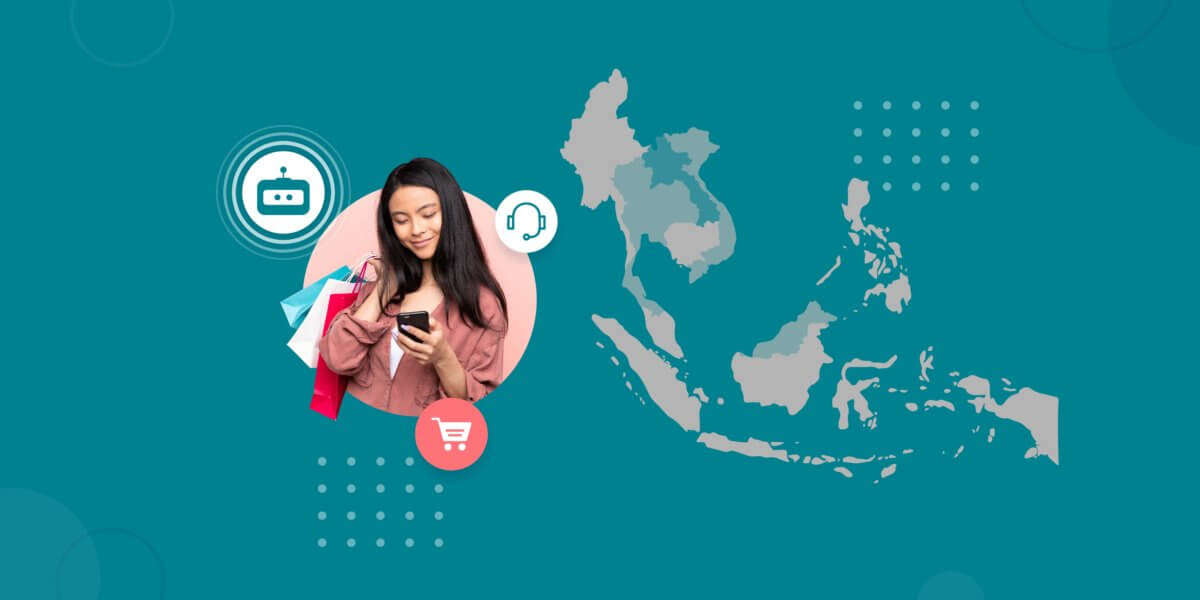Chatbots in Southeast Asia are Revolutionising E-Commerce

Chatbots in Southeast Asia are Revolutionising E-Commerce
Chatbots in Southeast Asia is an upward trend. With smartphone penetration sky-high, messaging channels take centre stage. We discuss 7 reasons why.
Technological adoption has led to the development of various AI-based technologies. One of which is the chatbot. Allowing businesses to offer immediate solutions to customer queries, chatbots in Southeast Asia have improved e-commerce considerably.
In the USA and China, the utility of chatbots is substantial, whereas the use of chatbots in Southeast Asia lag. Malaysia and Vietnam are showing early signs of AI development, however, the adoption rate is low, But, ASEAN countries are on the edge of developing AI-based technologies in various aspects. The main issue is not interest but lack of infrastructure.
Suggested Reading: 5 AI Trends Picking Up in Southeast Asia
The framework to support AI-based development and its application on the local level is at a primitive stage. Also, fundamental changes like adopting a data-driven style of decision making, adaptive learning algorithms, and other AI-linked opportunities are yet to unlock.
On the other hand, there is an upward trend in chat services. According to a survey commissioned by PayPal, 95% of Thai retailers consider social media a viable business tool. With this trend, Southeast Asia makes a viable base to test AI innovations and features in chat-related tools, i.e. messaging channels and chatbots.
The top Southeast Asian industries using chatbots
The 2021 Asia Chatbot Trend Report, on January 26, published insightful details about the use of chatbots in five countries — Hong Kong, Singapore, India, Japan, and Korea.
Published by Business Wire, the details reflect that 66% of poll respondents mention in five nations. 85% of respondents said they had used chatbot services in the previous six months.
With an increase in the use of chatbots in Southeast Asia, the top industries working towards the adaptation of chatbots in Southeast Asia are:
- Financial Services
- Transport
- Travel
- Healthcare
- Education
- Retail
- Human Resources
7 reasons chatbots are key to the e-commerce boom in the southeast Asian market
An AI chatbot is a conversational interface that engages users in various use cases. It’s mainly adopted to automate certain aspects of consumer contact, sparing human resources. In e-commerce, it effectively fulfils client requests, be it finding more information about a product or making payments or even getting support post-purchase.
A CNBC report suggests that applying the AI-powered chatbot application saves $20 million globally, which is expected to reach $8 billion by 2022. Further, a report by IDC’s Asia/Pacific Enterprise Cognitive/AI Survey indicates that 14% of SEA businesses implemented AI strategies to some extent. And another 37% plan to launch AI-related projects over the next five years.
When asked ‘when is the best time to introduce chatbots in your organisation?’, 50% of the respondents replied ‘this is the perfect time.’ From this, we can see how popular chatbots are.
E-commerce is a competitive industry. It’s important to provide a better customer experience to capture the market. With smartphone penetration being sky-high in SEA, messaging channels becomes the main mode of communication.
A Bain & Company study showed that more than 80% of digital consumers use social media or messaging apps to research products and connect with sellers. With the benefits an AI chatbot provides, there’s a clear win-win situation for both customers and businesses.
A very good example of a company using chatbots to improve customer interaction and sales is Aunty Reply by Unilever in Thailand. By providing food recommendations and recipes on chatbot, Knorr increased engagement by 50% and sales by 7%. Most importantly, it triggered brand awareness and recall by 32%.
The main benefits of NLP backed chatbot technology in SEA affecting the e-commerce boom include:
1. Offering personalised shopping experience
In the Southeast Asia market, one major factor that helps a business grow is when customers feel comfortable dealing with a business. And one of the ways to achieve it is by offering a personalised approach.
Chatbots are designed to make customers feel paid attention to. Personalisation can be based on their past interactions, shopping, website browsing history, age and gender. Conversational Chatbots that offer the best responses to match the needs of a customer are sure to prevail.
2. Ensuring better customer engagement 24*7
Better customer engagement in the context of chatbots refers to immediate availability and assistance. In Southeast Asia’s highly diversified markets, AI chatbots can act as the powerhouse of information.
They can answer customer questions and share relevant files. All this by being available round the clock, boosting e-commerce.
3. Quick notification and information
The implementation of conversational chatbots in Southeast Asia has great potential. Linked to the regional choices and culture, the variety and the products available are diversified. It thus increases the selection base.
Quick notification and proactive information sharing can help e-commerce businesses. Chatbots can make regular and potential customers aware of products, offers, and prices changes. Notifying a customer at the point of their query can help e-commerce improve business effectively. It will also reduce the cart abandonment rate.
4. Choose a relevant language for smooth communication
Using conversational chatbots in Southeast Asian businesses can overcome language constraints. Brands can design them to create workflows in multiple languages.
Users can select their preferred languages. Based on this information, AI chatbots can also route queries to agents who know the selected language. An example is the Kanmo Group, which provides multilingual support to users.
5. Automation of repetitive tasks
A business tends to encounter various yet generic repetitive questions. Resolving queries can be time-consuming. But, when solved timely, can lead to a positive customer conversion rate.
Chatbots can answer generic questions simply, reducing the burden on human resources. For example, one of our customers, Lido Learning moved to 100% chat support and automated most queries. This also improved their agent’s productivity drastically.
6. Customer engagement on social media platforms
Above, we discuss how the SEA market considers social media as a viable business tool. With conversational AI, chatbots can be integrated on social media platforms, including WhatsApp, Facebook and Instagram.
With this, e-commerce brands can engage with customers on their preferred channels, support customers, allow payments, etc. And all this with one interface for the agents. Hence, streamline the communication process and shorten the sales cycle.
Here, we would like to bring the example of Lido Learning again. They supported their customers on WhatsApp to increase engagement.
7. Cost reduction and better resource use
Last but not least is businesses in SEA using AI-powered chatbots to reduce cost and ensure better resource utilisation. Repetitive tasks can be shifted to chatbots, thus offering human resources time to learn new skills. At the same time, the cost of training a chatbot is a long-term investment that serves to reduce recurring training costs.
Suggested Reading: Social Commerce and Support in Southeast Asia
Conversational chatbots in SEA: earn higher ROI
Chatbots in Southeast Asia aim to offer better services in e-commerce. Allowing businesses to interact with customers seamlessly, they are the key to bringing in the boom in e-commerce.
A conversational chatbot with proper integrations and security has many benefits. It should smoothen interactions, enrich customers’ experience and help them through each step of their journey. On the other hand, it should also empower agents to resolve queries quickly and efficiently.
Verloop.io offers a platform to design conversational chatbots in Southeast Asia that can help to communicate seamlessly, respond effectively, and help e-commerce earn better efficiently. Talk to our team to know more.







